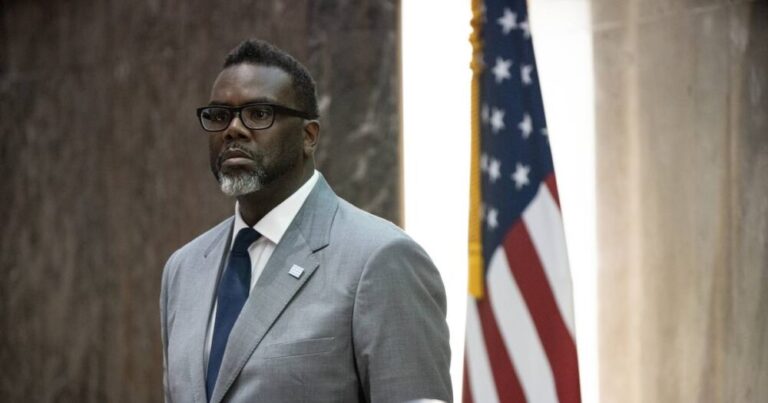Days before he was sworn in as Chicago’s mayor in 2011, Rahm Emanuel unveiled a series of goals from his transition team, including plans for the first 100 days.
Lori Lightfoot similarly held a pre-inaugural news conference in 2019 detailing her transition committee’s recommendations and her aspirations for the administration to come.
Since winning the April 4 election to become Chicago mayor, Brandon Johnson has taken a much different approach to the change from candidate to mayor.
Like Emanuel and Lightfoot, Johnson followed the traditional model of calling together experts from across the city to recommend the best way forward.
But unlike his predecessors, Johnson has not rushed to make personnel changes or even unveil his transition report until this week, nearly two months into his term in office. At a news conference Thursday, Johnson and his team are expected to unveil a series of recommendations that will set the stage for what he hopes is a model of progressive governance across the country.
Transition committee reports are usually aspirational documents. But the report serves as a model of the administration’s goals, setting benchmarks for critics and supporters alike to evaluate success.
To some, the Johnson transition committee’s unusually slow process raises broader concerns about the administration’s pace in its early days and questions about its organization. The new mayor has not rushed to fill some key positions and other priorities have gone unfulfilled.
Johnson didn’t announce a corporation counsel until about three weeks into his administration, for instance. Emanuel and Lightfoot were also both quick to overhaul the Board of Education: Lightfoot announced days into her term she would replace all members, while her predecessor didn’t even wait until he got in office to name a new board and Chicago Public Schools CEO, though Emanuel had more time because he didn’t have to face a second round of voting. Johnson made no move to shake up the school board until this week.
And while Johnson has defended his pace, his administration notably announced there would be no questions taken or interviews granted at his transition report unveiling.
The new mayor has addressed early criticisms of his tenure, including his administration’s response to the ongoing migrant humanitarian crisis as well as summer gun violence, by highlighting how he has only just assumed the role and says he was given the shortest transition period in Chicago history.
During a May news conference shortly after being inaugurated, Johnson answered a question about his apparent lack of a plan for the migrants by turning to his senior aide and asking, “How many days has it been again, Jason? Nine, 10 days?” Last month, he again glanced at an aide when addressing the same topic by prefacing that he had been mayor for 37 days.
Some officials caution that an unhurried pace isn’t always a red flag.
Ald. Brian Hopkins, 2nd, said he surmises the late rollout of the transition report was because the fledgling administration must work through existential questions of its direction after running on Chicago’s most anti-establishmentarian platform in decades.
Will the progressive-minded Johnson indeed barnstorm the “politics of old,” as he often phrased it on the campaign trail, or will he show restraint? His appointments thus far have straddled that ideological divide; Hopkins himself was appointed chair of a new public safety committee in City Council despite supporting Johnson’s runoff opponent Paul Vallas.
“I think we’re all anxiously awaiting that report and arguably, it’s a little bit behind schedule,” Hopkins told the Tribune ahead of the document’s debut. “But I assume that’s because there were some things that needed to be worked out. You know, the mayor said all along he wanted an inclusive and diverse team, which means you’re going to have conflicting viewpoints.”
During the runoff, Johnson said he would fire the city’s public health commissioner, Dr. Allison Arwady, who clashed with the Chicago Teachers Union and other progressive mayoral allies over school reopening plans during the COVID-19 pandemic. But Johnson has yet to make changes to the department. Longtime City Hall staff grumble about the pace of decision making as Lightfoot-era cabinet heads have stayed on in quasi-probationary positions that some observers have compared to the “90 Day Fiancé” reality show.
City Hall is considering who would replace Arwady, with one potential option being Eric Reinhart, a physician who is an outspoken critic of the way public health systems currently operate.
Hopkins, who has served as aldermen under three mayors, noted that for now he applauds what appears to be a new administration “taking a little bit longer to make sure you get it right.”
“You know what? It takes time,” Hopkins said. “It takes time to identify and recruit those key individuals that you want to put in those key positions. He may not have fully appreciated that as Candidate Johnson. He gets it now as Mayor Johnson.”







